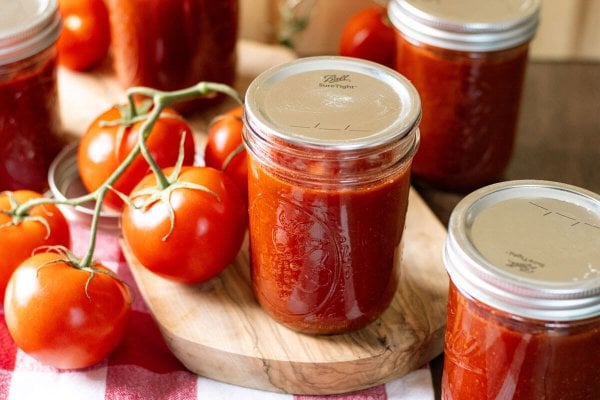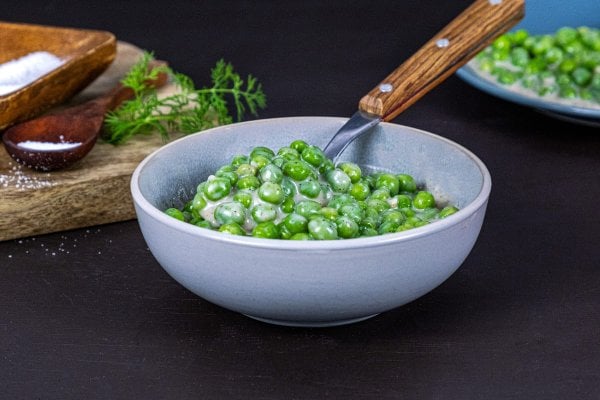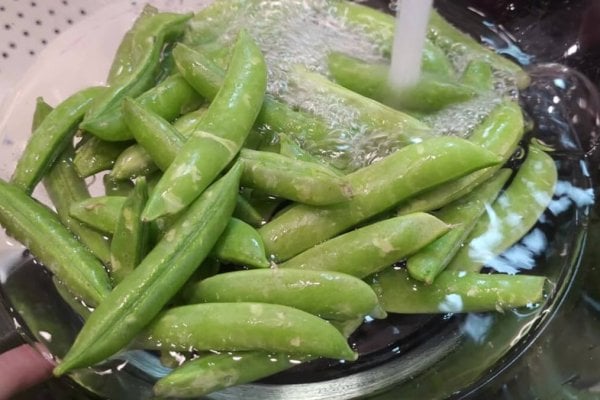



Having farm fresh eggs is one of the many joys of living the homesteading life. We just love the natural cycle of the seasons and how certain times of year we’re getting a bounty of eggs, while other times of year egg production slows down. But we’re never without eggs thanks to some of our favorite egg preservation methods!
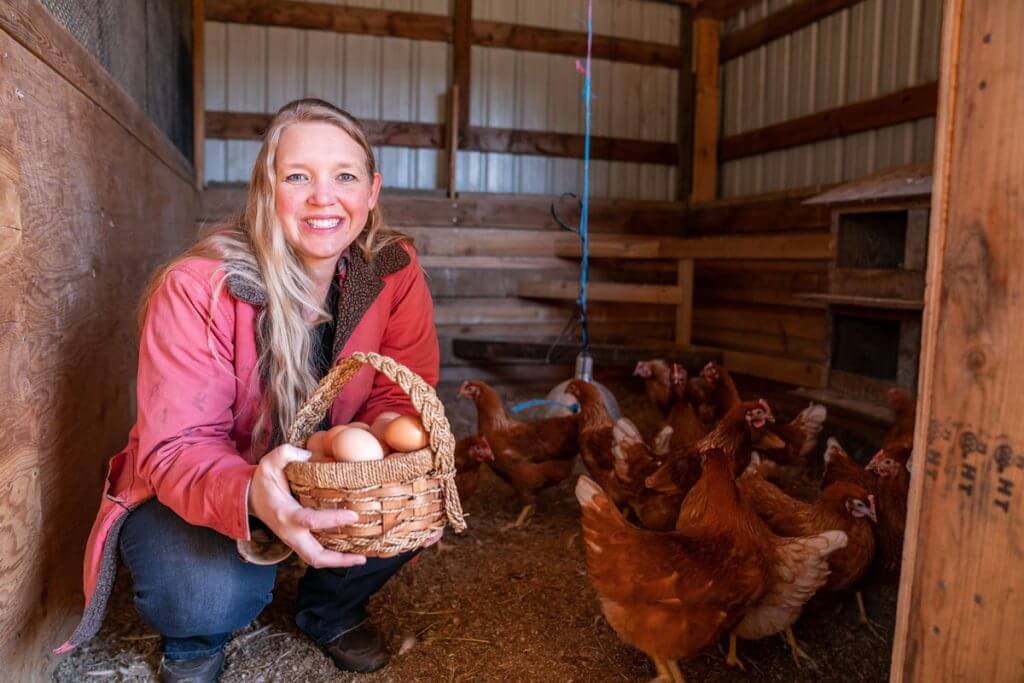
Having egg-laying chickens, ducks, guineas, and geese is a perfect example of this ebb and flow. When Spring-time rolls around, I can always know it’s here because our egg-laying animals really pick up production. In early spring we can be getting around two dozen eggs a day!
We love that we get a variety of blue eggs, green eggs, brown eggs, and even pink eggs! Sure, two dozen eggs may seem like a lot to some people, but for our large family, it’s just about right.
Once the egg production picks up, even more, we like to start preserving the extra eggs for the winter by water-glassing, freezing, pickling, and even turning eggs into preservable food with our homemade egg noodles.
We love having these preserved egg products on hand when egg production slows down, and we’re not getting enough for our daily needs.

Handling Chicken Eggs
If you’re keeping your hen house nice and clean, especially during the springtime when the chickens and ducks might be going out and splashing through puddles of mud, then ideally, your eggs are coming in nice and clean, too.
This is the optimal scenario because when it comes to farm-fresh eggs, you really don’t want to wash them. God created eggs with a natural protective layer that helps prolong the shelf life. If you wash your eggs, you’re removing this protective layer and your eggs won’t last as long.
Do I need to refrigerate eggs if they’re farm-fresh?
If you have some eggs that are coming in dirty or muddy, then you’ll want to clean out your egg boxes. Ideally, the eggs you bring in from the coop or barn will be nice and clean.
As long as your eggs are clean, they can last for weeks at room temperature, no need for refrigeration. I’ve read that storing eggs for one day at room temperature is like one week in the refrigerator, so plan accordingly based on how quickly you’ll eat them. Because of our large family, we can leave all our eggs on the counter and still enjoy fresh eggs on a daily basis.
If you have some eggs that are coming in dirty or muddy, then you’ll want to clean out your egg boxes. Ideally, the eggs you bring in from the coop or barn will be nice and clean.
As long as your eggs are clean, they can last for weeks at room temperature, no need for refrigeration. I’ve read that storing eggs for one day at room temperature is like one week in the refrigerator, so plan accordingly based on how quickly you’ll eat them. Because of our large family, we can leave all our eggs on the counter and still enjoy fresh eggs on a daily basis.
If it’s just you, or maybe only a couple of people in your family, you’ll want to check out all my egg-preservation techniques here.
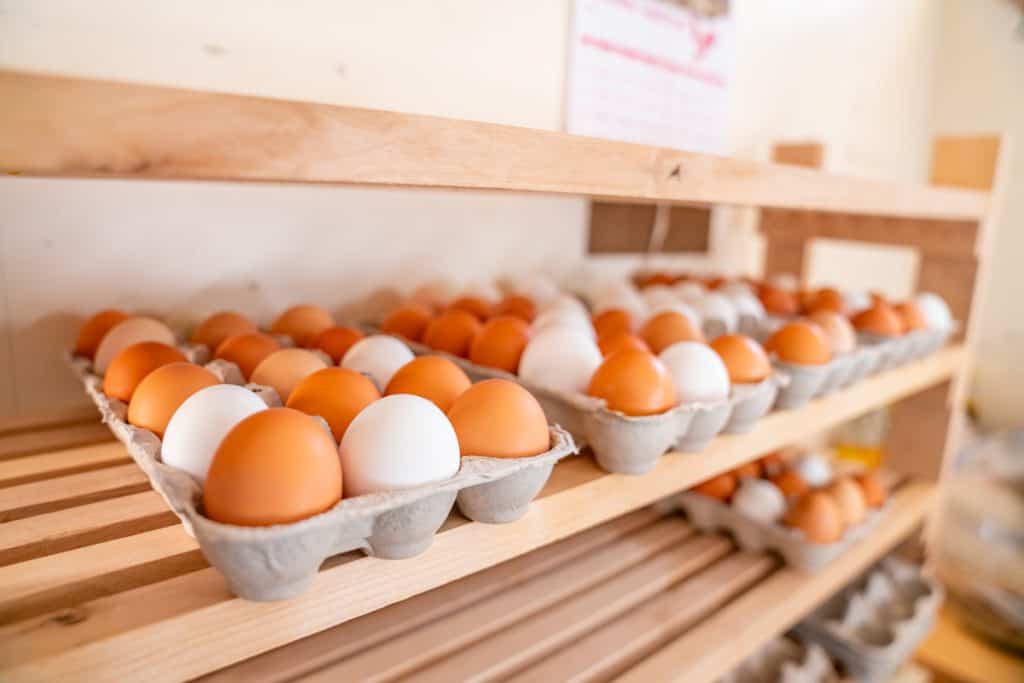
Proper Farm Fresh Egg Storage Tips
Unwashed eggs that are farm-fresh can safely be stored at room temperature. We recommend having some kind of egg organizer so you know which eggs are freshest and which need to be used up next.
You can also use egg cartons, properly labeled with dates. Whatever your methods for storing, you can rest assured that your farm-fresh eggs are weeks fresher than those found in the grocery store.
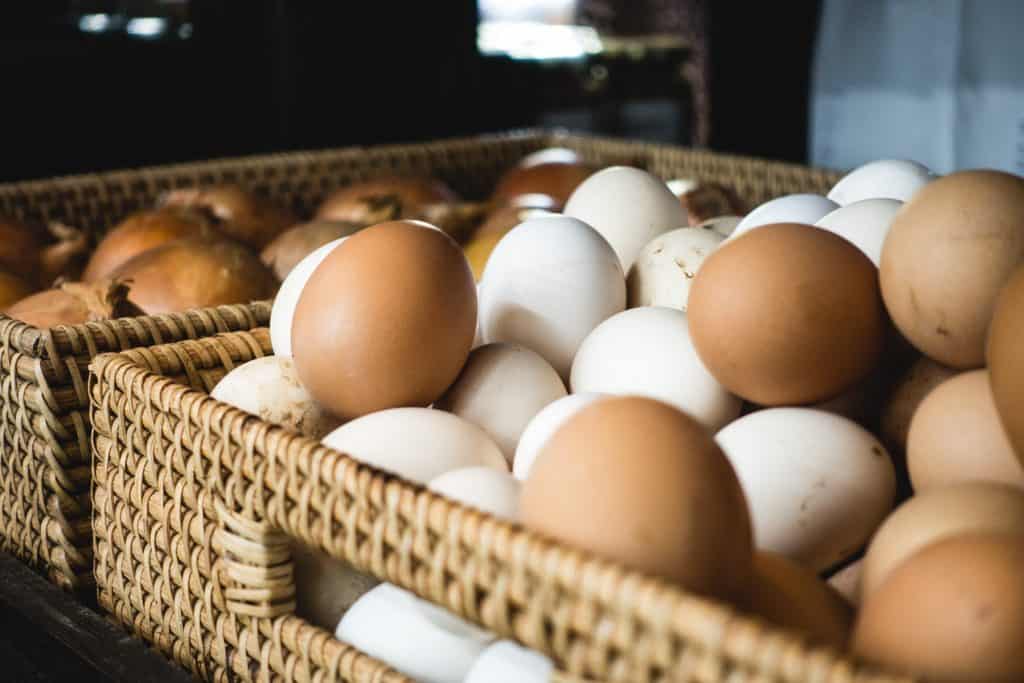
Do you need to wash farm-fresh eggs?
No! If your eggs are coming into the house clean, then you’re doing a good job keeping the hen house and nesting boxes clean. We recommend you don’t wash your eggs, if at all possible.
If you do have a dirty egg, go ahead and wash it and be sure to use that egg first, preferably within a day or two.
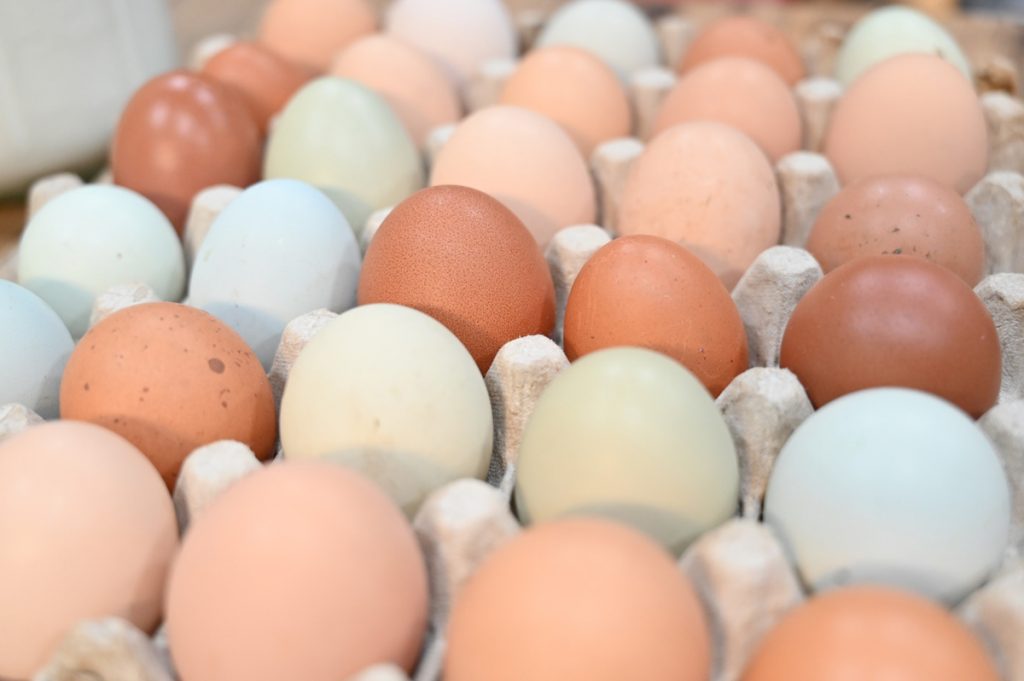
How do I wash dirty eggs?
Homesteading Hack – to wash your eggs, dip them in warm water and let them sit wet on the counter for just a few minutes. Come back and the dirt should wipe right off.
Sometimes ducks and geese will do a great job at hiding their nests and you may not find them for a couple of weeks. If you happen to stumble on a nest filled with a clutch of eggs, don’t just grab all the eggs and bring them into the kitchen and start cracking them open! You may end up with some really stinky items!
We like to do the “bad egg test.”
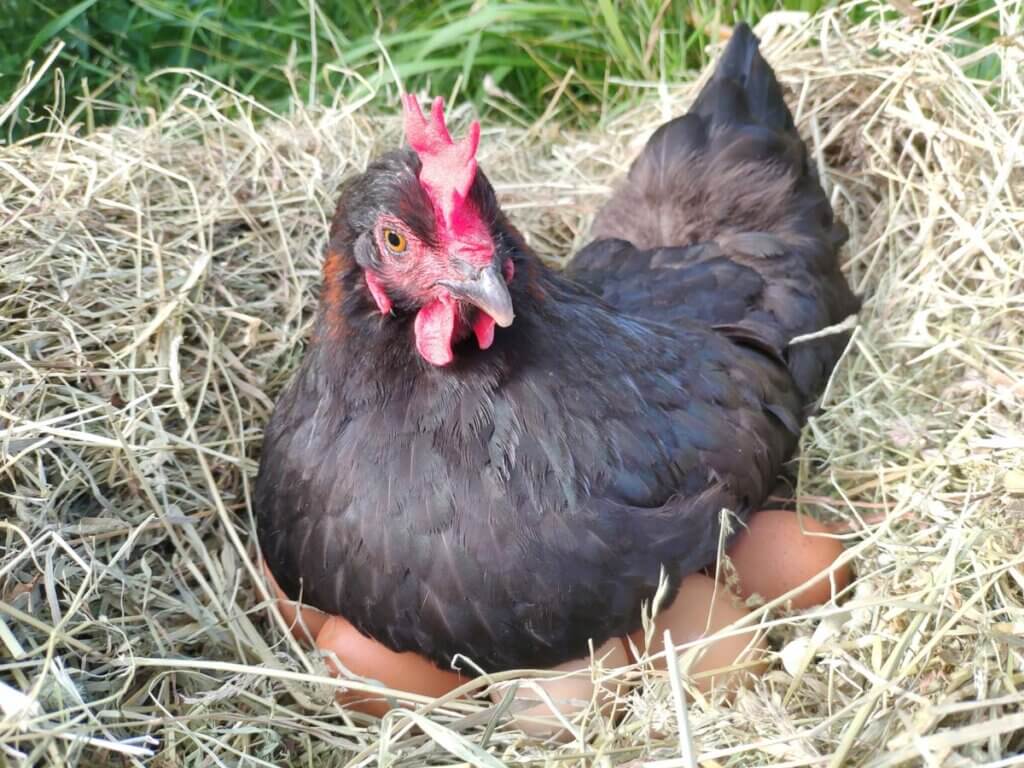
How do you know if your eggs are bad?
Knowing if your eggs are safe to eat is important. But how can you tell if an egg is bad unless you crack it open? EASY!
Start off with a bowl filled with room temperature water and drop your eggs in, one at a time. If your eggs sink straight to the bottom and lay on their side, then you know your eggs are fresh. These eggs are perfect for fried eggs for breakfast or delicious bacon frittata!
If your eggs start turning up on their end and slightly floating, then you’ll know the eggs are starting to get a little bit older. These will be great for making hard-boiled eggs, otherwise, they’ll be extremely difficult to peel.
If your eggs float when dropped in a bowl of water, then don’t crack them in the kitchen! Get them far away from the house and safely get rid of them to avoid a potentially stinky mess.

How old are store-bought eggs?
Store-bought eggs are at least 6 weeks old! Consider all the nutrients that have already been lost in that time! Not to mention, store-bought eggs have also been washed and should never be stored at room temperature.
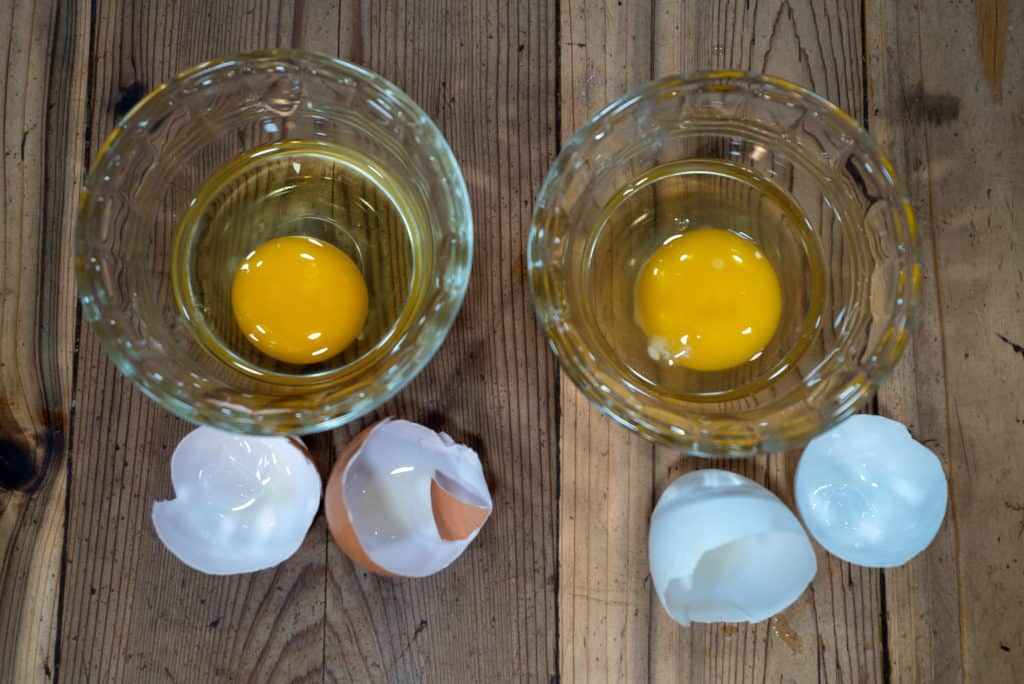
Egg Preservation Methods
If you find yourself with an abundance of eggs, DON’T THROW THEM OUT! We have many ways to safely preserve eggs. Check them out and find out which one works best for you!














